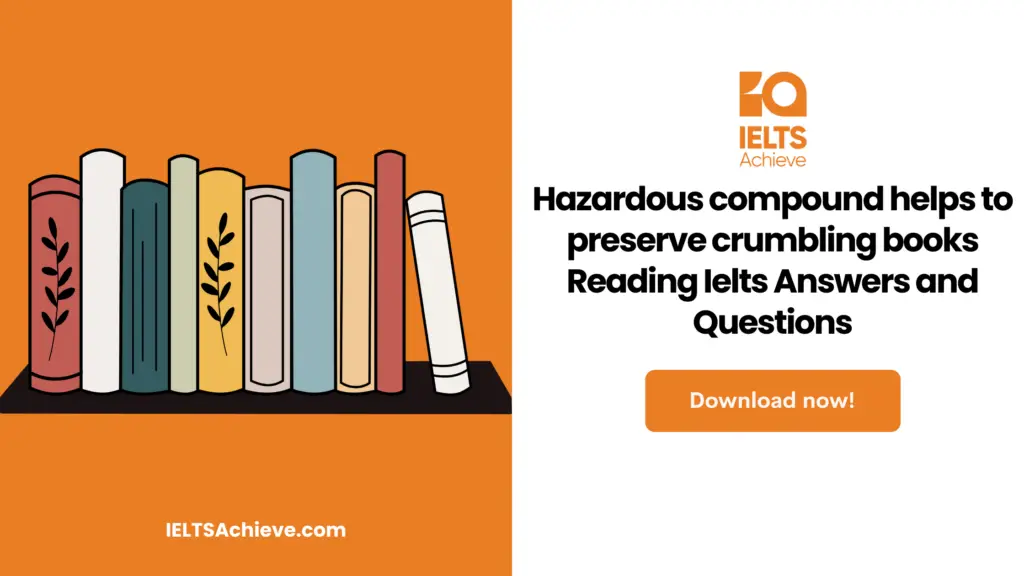The Blog post contains the following IELTS Reading Questions:
- IELTS Reading True, false, or not given
- IELTS Reading Flow chart completion
- IELTS Reading Matching features
Stay informed and prepared for success – Explore our comprehensive Reading Test Info page to get valuable insights, exam format details, and expert tips for mastering the IELTS Reading section.
IELTS Reading Passage – Hazardous compound helps to preserve crumbling books

Hazardous Compound Helps to Preserve Crumbling Books
Librarians may be able to save millions of books from slowly crumbling with a new chemical process that uses a hazardous flammable compound, diethyl zinc (DEZ). Chemists in the US have successfully completed an 18-month trial of the technique, which neutralises the acids in paper which cause books to decay. The method was developed by the Dutch chemical giant, Akzo, in collaboration with the US Library of Congress. It can treat 1,000 books at a time at a fraction of the cost of digitising. The world’s libraries and archives are today stocked mainly with books that are destroying themselves because of a new way of making paper that was introduced over a hundred years ago. In this process, wood pulp became the main source of the cellulose from which paper was made, replacing the cotton or linen rags used previously.
Unfortunately, book publishers were unaware that the slightly acidic nature of wood pulp would eventually threaten their work. The acid attacks the cellulose polymer of paper, breaking it down into shorter and shorter pieces until the paper’s structure collapses. The only answer is to neutralise the acids in the paper by chemical means. This has generally been done by unbinding the book, treating it page by page with a carbonate solution, and then rebinding it. The cost can be as much as £200 per volume. Akzo’s method can be done without taking the binding off the book.
On the face of it, DEZ would seem the last chemical that should be brought in contact with paper. This volatile liquid bursts into flames when it comes in contact with air. However, it is not DEZ’S sensitivity to oxidation which is the key to its use as a preserving agent, but its ability to neutralise acids by forming zinc salts with them. Because DEZ is volatile, it permeates the pores in paper. When it meets an acid molecule, such as sulphuric acid, it reacts to form zinc sulphate and ethane gas. DEZ is such a strong base that it will react with any acid, including the weaker organic ones. It will also react with any residual water in the paper to form zinc oxide. This is an added bonus for the book conservators, since it buffers the paper against future attack by acidic gases from the atmosphere, such as sulphur dioxide.
Not only will DEZ protect against acid attack, but it is also capable of neutralising alkalis, which threaten some kinds of paper, it can do this because zinc oxide is amphoteric – capable of reacting with either acids or alkalis. The Akzo method treats books that are closed, yet protects every page. It adds about two per cent of zinc oxide to the weight of the book. Much of this is deposited near the edges of the pages, the parts which are most affected by the acid from readers’ fingers or environmental pollution. The only risk in the Akzo process comes from the DEZ itself; this compound caused a fire at NASA’s Goddard Space Flight Center where earlier tests on the method were carried out.
For the process, the books are gently heated under vacuum for a day to remove residual traces of moisture. The chamber is then flushed with dry nitrogen gas for five hours to remove the remaining air before DEZ is introduced at a low pressure into the gas stream. DEZ is passed through for about eight hours. Unreacted DEZ is trapped out of the exit gases and recycled, while the ethane is burned off. When the process is complete, the chamber is purged with nitrogen to remove residual DEZ. The whole process takes about three days. The cost per book is about £2, considerably less than the £40 for digitising.
This work was originally funded by the US Library of Congress, which has over 10 million books now at risk. According to Dick Miller, Akzo’s director for book preservation, tests have shown that the method can deal with hundreds of books at a time. A million books a year could be rescued by the new process, for which Akzo has been granted exclusive rights. The treated books should then survive for hundreds of years. Another national institution, the British Library, launched an adopt-a- book scheme to help it meet the costs of processing books. The British Library has so far raised over £80,000. But if the traditional method were used, this would barely cover a twentieth of one per cent of the two million books the Library needs to treat. Edmund King of the British Library’s preservation service says that the Library has developed another method which coats the individual fibres of the paper with ethyl acrylate polymer, protecting the books not only against acid attack but actually making them stronger. The British Library is now seeking an industrial partner to exploit its work.
Unlock your full potential in the IELTS Reading section – Visit our IELTS Reading Practice Question Answer page now!
Recommended Questions:
Renewable Energy IELTS Reading Question with Answer
Hazardous compound helps to preserve crumbling books Reading Questions
Questions 1-4
Do the following statements agree with the information given in Reading Passage 1? In boxes 1-4 on your answer sheet, write
TRUE if the statement agrees with the information
FALSE if the statement contradicts the information
NOT GIVEN If there is no information on this
1.The Akzo preservation method is more expensive than other techniques.
2. DEZ’s ability to neutralise acids is the reason why it is used as a preserving agent.
3. The US Library of Congress has exclusive rights to the new book preserving process.
4. Preservation scheme of the British Library is more efficient than the scheme of the US Library of Congress.
Enhance your skills in identifying information as True, False, or Not Given. Click here to discover expert strategies and techniques for mastering this question type in the IELTS Reading section.
Questions 5-8
Choose FOUR letters A-H. Which FOUR of the following attributes describing diethyl zinc (DEZ) are mentioned in the passage?
1. it bursts into flames when it comes in contact with an
2. it forms a protective layer of zinc oxide on the surface of the paper
3. it changes acid into zinc sulphate throughout the paper
4. it reacts with acids to produce zinc salts and water
5. it can react with both acids and alkalis
6. the chemical reactions it causes make books heavier
7. it coats the fibres of the paper with ethyl acrylate polymer
8. it tends to retain water within the paper structure
Improve your performance in Matching Features questions by clicking here to access our comprehensive guide. Learn how to match specific features or characteristics with the options provided in the IELTS Reading section.
Questions 9-13
Complete the flow chart below. Choose NO MORE THAN TWO WORDS from the passage for each answer.
AKZO BOOK PRESERVING METHOD
| books are heated under vacuum in chamber | moisture removed |
| (9)…..is circulated for five hours | residual air removed |
| diethyl zinc is channelled into (10)……. | |
| DEZ is circulated | leftover diethyl zinc is removed and (11)…..ethane is removed and (12)…….. |
| chamber is flushed using (13)…… | remaining diethyl zinc is removed |
Boost your performance in Summary, Notes, Table, and Flowchart Completion tasks. Click here to explore our detailed guide and learn how to effectively complete summaries, notes, tables, and flowcharts in the IELTS Reading section.
Unlock your full potential in the IELTS Reading section – Visit our IELTS Reading Practice Question Answer page now!
Recommended Questions:
Renewable Energy IELTS Reading Question with Answer
Hazardous compound helps to preserve crumbling books Reading Answers
1. Answer: False
2 .Answer: True
3. Answer: Not Given
4. Answer: Not Given
5. Answer: B
6. Answer: D
7. Answer: E
8. Answer: F
9. Answer: (DRY) NITROGEN (GAS)
10. Answer: (GAS) STREAM
11. Answer: RECYCLED
12. Answer: BURNED OFF
13. Answer: NITROGEN

We hope you found this post useful in helping you to study for the IELTS Test. If you have any questions please let us know in the comments below or on the Facebook page.
The best way to keep up to date with posts like this is to like us on Facebook, then follow us on Instagram and Pinterest. If you need help preparing for the IELTS Test, join the IELTS Achieve Academy and see how we can assist you to achieve your desired band score. We offer an essay correction service, mock exams and online courses.
